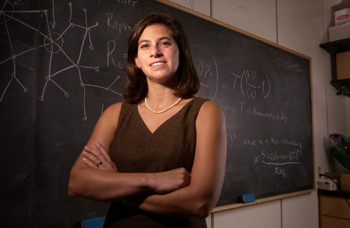 AUSTIN, Texas—Natural selection may favor the fittest organisms around, but it doesn’t always lead to the evolution of the most optimal organisms, says a team of researchers at The University of Texas at Austin.
AUSTIN, Texas—Natural selection may favor the fittest organisms around, but it doesn’t always lead to the evolution of the most optimal organisms, says a team of researchers at The University of Texas at Austin.
Drs. Matthew Cowperthwaite and Lauren Ancel Meyers led a team that developed a new theory suggesting that traits that are easy to evolve are favored over those that are more difficult.
Genetic mutations create the raw material that natural selection acts upon. In the short term, mutations that make organisms more fit tend to persist through generations, while harmful mutations tend to die off with the organisms that possess them.
The long-term consequences of mutations, however, are not well understood by evolutionary biologists.
To investigate this further, the University of Texas at Austin team developed computer models of RNA molecules evolving by mutation and natural selection. RNA molecules, which are very similar to DNA, play key roles in essential life processes and serve as the genetic material for some our deadliest viruses, including influenza and HIV.
Their models show that the evolution of optimal organisms often requires a long sequence of interacting mutations, each arising by chance and surviving natural selection.
“Some traits are formed by many different combinations of mutations and are easy to evolve,” explains Cowperthwaite. “Others are made from an unlikely genetic recipe are hard to evolve. Evolution gives us the easy ones, even when they are not the best. Life may not always be optimal.”
The researchers analyzed RNA from a wide variety of species and the results suggest that life is indeed dominated by the “easy traits,” perhaps at the expense of the best ones.
The results appear in the July 18 issue of PLoS Computational Biology.
Cowperthwaite recently received his Ph.D. from The University of Texas at Austin and is the research director of the NeuroTexas Institute Center for Computational Neuroscience at St. David’s Medical Center. Meyers is an associate professor in the Section of Integrative Biology at The University of Texas at Austin. Other co-authors on the paper include Ecology, Evolution and Behavior graduate students Evan Economo, William Harcombe and Eric Miller.


















Comments